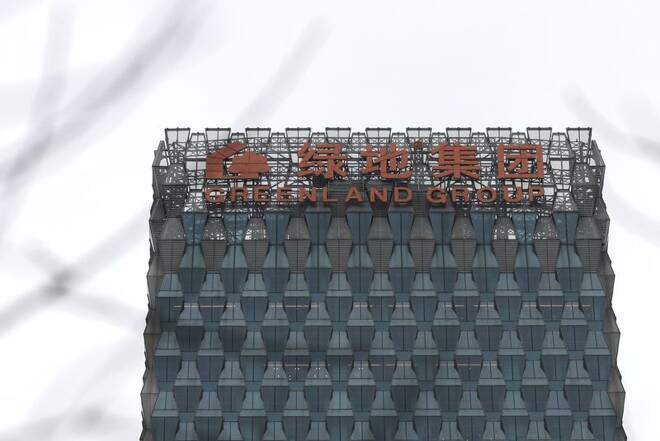Advertisement
Advertisement
S&P cuts Chinese state-backed developer Greenland to ‘selective default’
By:
HONG KONG (Reuters) -Ratings agency S&P Global on Wednesday downgraded Greenland Holdings to "selective default", after the Chinese state-backed property developer extended the maturity of its $500-million bonds by one year.
By Clare Jim
HONG KONG (Reuters) – Chinese state-backed Greenland Holdings Corp Ltd was on Wednesday downgraded to “selective default” by rating agency S&P Global, after the property developer extended the maturity of its $500-million bonds by one year.
Shanghai-based Greenland is the first state-backed developer to extend a dollar-bond payment since the country’s property sector plunged into a debt crisis, triggering a string of defaults, last year.
“We view the transaction as a distressed debt restructuring and tantamount to a default,” S&P said in a statement explaining the “selective default” rating, adding Greenland likely would have lacked the resources and funding options to fully repay the notes upon maturity had they not been extended.
The latest downgrade comes amid renewed concerns about the sector, with property developers scrambling to boost sales after a nosedive in transactions in January to May, as China’s strict COVID-19 curbs and economic downturn hit sentiment.
A desperate developer in China’s softening property market is coming up with a novel promotion to attract buyers, recently offering to take wheat and garlic as downpayments.
Among private developers, many players have already offered bond exchanges to ease their liquidity pressures while a few, including China Evergrande Group and Sunac China, have defaulted on some payments.
Greenland, China’s No. 7 property developer and highly leveraged, became swept up in a sector-wide debt crisis that roiled international markets last year amid fears that a large-scale developer collapse could derail the economy.
Like many of its peers, it reeled from tighter caps on debt ratios introduced in January 2021 that resulted in a liquidity squeeze across the sector.
Reuters last year revealed Greenland’s financial straits and subsequent bailout, highlighting more active and targeted action being taken by authorities as they sought to limit risks posed by the industry.
Greenland, responsible for marquee projects at home and abroad, last week secured bondholders’ approval to extend the maturity of its 6.75% notes – with $488 million outstanding – by one year to June 25, 2023.
S&P said Greenland still faces a significant amount of offshore debt maturities over the next 12 months, totalling about $2.4 billion.
In an exchange filing last month, Greenland said the group’s business operations, financial performance and short-term liquidity had been adversely affected by COVID-19 outbreaks in Shanghai and across the country as well as the pandemic control measures.
Wu Zhengkui, general manager of Greenland’s finance department, told investors the firm was “fully capable” of repaying on time three other bond tranches due later this year, as the June payment was only affected by cashflow disruptions due to lockdowns since March, according to a memo seen by Reuters.
The bond in question traded at 46.6 cents on the dollar on Wednesday, compared to 46.7 cents in the previous session.
Shares of Greenland listed in Shanghai eased 1.3%, versus a 0.9% drop in the CSI Real Estate Index.
(Reporting by Clare Jim; Editing by Uttaresh.V and Mark Potter)
About the Author
Reuterscontributor
Reuters, the news and media division of Thomson Reuters, is the world’s largest international multimedia news provider reaching more than one billion people every day. Reuters provides trusted business, financial, national, and international news to professionals via Thomson Reuters desktops, the world's media organizations, and directly to consumers at Reuters.com and via Reuters TV. Learn more about Thomson Reuters products:
Advertisement
